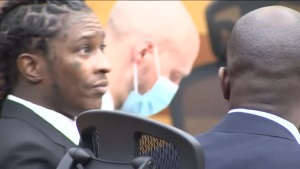
After the prosecution’s unsuccessful attempt to move it to March, the criminal trial of Jeffery Lamar Williams, known professionally as Young Thug, and 27 other individuals is set to begin with the new year, and jury selection will start on Jan. 5 at the Fulton County Courthouse in Atlanta. Williams and the others were indicted last May under Georgia’s RICO Act. They have been accused of committing numerous crimes as part of a criminal organization referred to as “Young Slime Life” and face various charges.
By order of presiding judge Ural Glanville, the Court has issued subpoenas sufficient to secure the appearance of 600 prospective trial jurors, who are required to appear at the courthouse on January 5 and 6 and fill out jury questionnaires.
Individual voir dire of prospective jurors is scheduled to begin on January 9, with prospective trial jurors appearing daily in panels of 24. Voir dire is the process through which jurors are selected, wherein both the judge and the attorneys for the prosecution and the defendants may ask questions of each juror directly to determine their fitness to serve on the jury and whether they may be impermissibly biased against a party. For example, the prosecution intends to use hip-hop lyrics sung by Williams and others to prove their case, so potential biases against or in favor of rap artists and hip-hop music will likely factor heavily in these proceedings.
Voir dire is more than simply filling a jury box. It is a critically important part of the trial process because, when done correctly, it allows each party to weed out witnesses who may be biased against them or simply unlikely to decide in their favor. This is of tremendous importance where, as in this case, a jury verdict must be unanimous, or the claim will result in a mistrial.
As part of voir dire, all potential jurors are first given some background on the case – typically, in a criminal case, by reading the indictment. They are then administered the voir dire oath and must swear that they will answer all questions truthfully. There are several questions that the judge must ask members of the panel by law, after which the party’s attorneys may address questions to the panel, either to the entire panel or to specific individuals.
Either party may seek to strike a particular prospective juror based on their court responses and the questionnaire. A party may challenge a juror “for cause” as many times as they choose, in which case counsel must demonstrate to the judge that the juror is ineligible to serve on a jury, has an interest in the case, or has a relationship with a party in the case, or when there is suspicion of actual bias against the party in the mind of the juror.
Additionally, each party is allowed three preemptory challenges, which a party may use to strike a juror without giving any reason. The Supreme Court has applied limits on preemptory challenges – in Batson v. Kentucky, the Court held that the Fourteenth Amendment guarantees a defendant that the state cannot exclude members of his race from the jury on account of their race and provided a framework that puts the burden on the state to put forward a race-neutral explanation for exclusion in instances where race appears to have been used to exclude.
The YSL trial promises to have a lengthy and challenging jury selection process. Even though several of the 28 defendants initially charged have taken plea deals, the parties have estimated there will be as many as 300 witnesses and 20 experts testifying. The trial may take between six and twelve months to complete. This makes jury selection particularly difficult since most prospective jurors will do whatever they can to get out of jury duty. In Georgia, anyone called for jury duty may defer or postpone jury service one time. Additionally, there are numerous exempted categories, including students, people over 70, and caregivers to children under 6, as well as deferrals granted for other reasons that do not fall within an exempted category (e.g., needing to work to support one’s self or one’s family would likely be a reason to grant a deferral where the trial would likely last 6 to 12 months).
The Court has subpoenaed 600 prospective jurors because it anticipates that it will end up granting a deferral or exemption to the vast majority of those individuals. With the Court conducting voir dire of prospective jurors in panels of 24 each day, jury selection, in this case, could take a long time. And these voir dire proceedings may be contentious as the parties probe for many relevant potential biases, including race, hip-hop, and the music industry.
The post Young Thug/YSL Trial Could Last an Entire Year: Who Wants To Serve on the Jury? appeared first on The Source.
